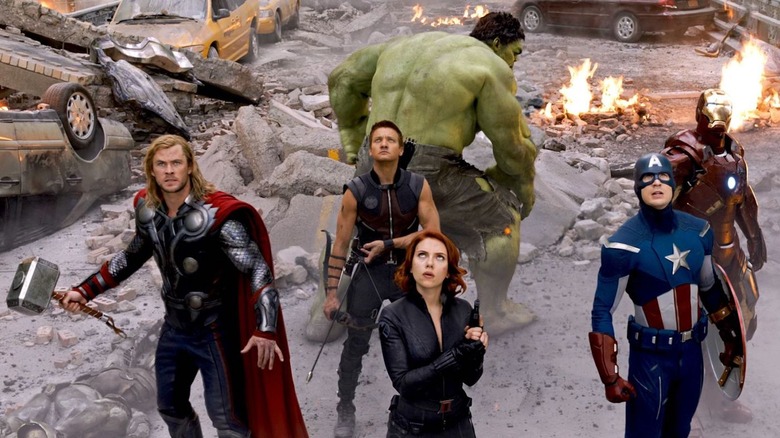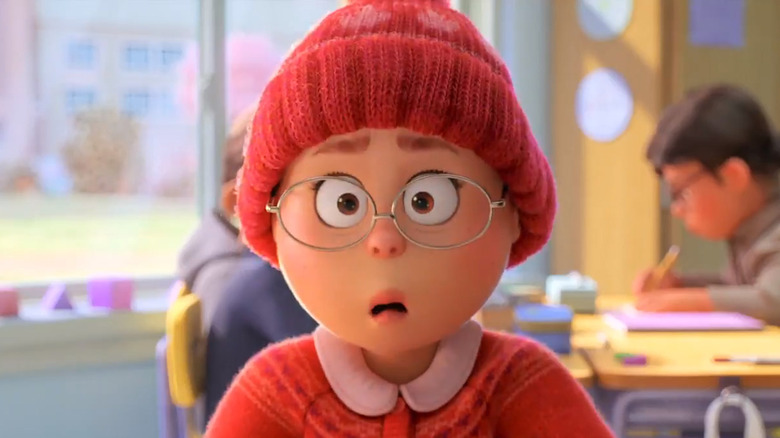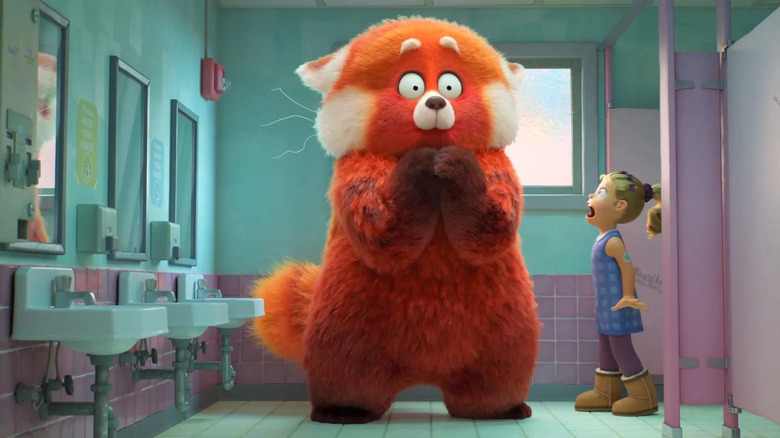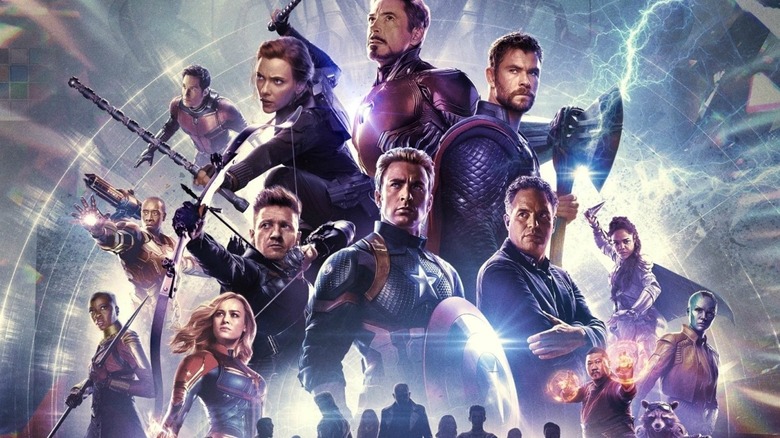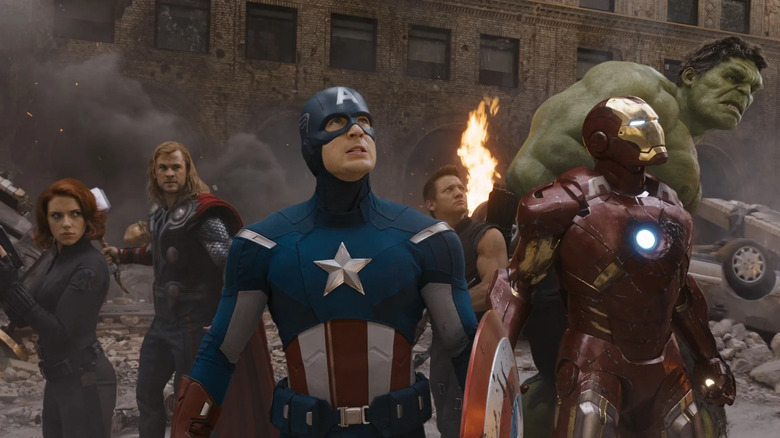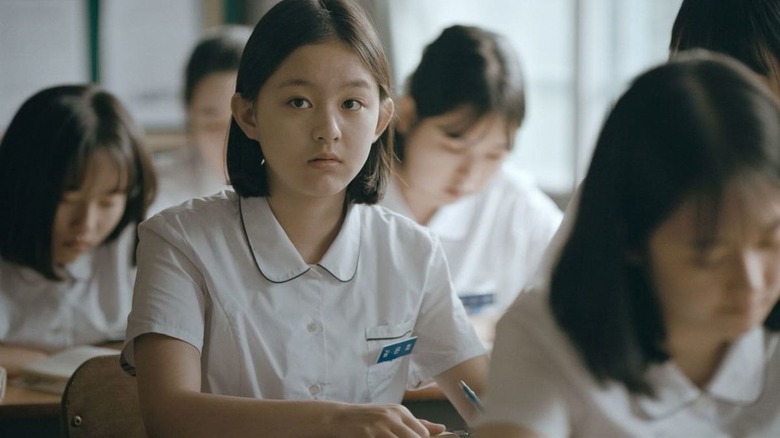Movies Aimed At Adults Are Out There, You Just Have To Find Them
(Welcome to The Soapbox, the space where we get loud, feisty, political, and opinionated about anything and everything.)
On April 14, 2022, a YouTube critic named The Mysterious Mr. Enter posted a video review of Domee Shi's animated film "Turning Red" wherein he took exception to many of the film's details, ultimately emerging on the other side unimpressed. Among his complaints were the character of Ming Lee (Sandra Oh), the mother of the film's protagonist Mei Lee (Rosalie Chiang), which Mr. Enter cited as being cruel and clueless to the point of being unrealistic. He admitted to feeling uncomfortable at the sight of a parent figure so overbearing (which, one might argue, was perhaps the point). Mr. Enter also took exception to the film's broad, anime-inspired style, feeling a more subdued aesthetic would have been more appropriate to tell a down-to-earth story about adolescent feelings and the trials of puberty. "Turning Red" takes place in Toronto in 2002, and Mr. Enter also — rather incorrectly — posited that anime did not become a cultural force in North America until 2005. One may implore Mr. Enter to look up shows like "Astro Boy," "Gigantor" and "Speed Racer," anime shows which all aired on American TV in the 1960s.
Ignoring a few opening moments of brash culture-war nonsense (Mr. Enter argues that "Turning Red" is being critiqued — by whom he doesn't say — as a political object, not acknowledging that all art is inherently political), much of Mr. Enter's critiques centered on the film's 2002 time period. He points out that boy bands — a central detail of the main characters' lives — were on the wane in 2002, that he doesn't recall it as an "in-your-face" time in pop history; he recalls bands like Linkin Park over LMNT. Most notably — and this was a detail that gained traction on Twitter when a user named CocoaFox023 posted a short clip of Mr. Enter's review — Mr. Enter claimed that "Turning Red" was not realistic in its depiction of 2002 Toronto because there was not a single reference to 9/11.
The major theme of the decade
Many immediately chimed in with how baffling this complaint was. "Turning Red" is about the drama of puberty and the roller coaster of adolescent emotions, filtered through a fantasy lens of lycanthropy; a young girl becomes an eight-foot-tall red panda when her emotions are at a high ebb. Her emotional state is especially difficult to wrangle when she lives in a strict household, eschewing strong personal feelings over expected devotion to her household, certainly antithetical to one's wrestling with her first brushes with teenage lust. 9/11 was not part of the story. It did not play into the characters' personal lives at all.
Did Mr. Enter expect a playful, colorful animated fantasy about 13-year-olds questing to see a boy band to address the heady social difficulties of the post-9/11 world? Is Mr. Enter looking to lightweight fantasy entertainment to confront adult material? It seems he did. And, it seems, he wasn't the only one.
Mr. Enter's full quote is as follows:
"This film takes place less than a year after the September 11 terrorist attacks. I bring this up because it radically altered the culture of the time in ways that make this movie feel exceptionally ignorant of the time. Even though literally the only reason I can comprehend this movie is set explicitly in 2002 is because the director grew up in that exact year. Yes, this film takes place in Canada, not the United States, but all over the Western World — Canada, America, the UK, much of Europe — people were paranoid because 9/11 wasn't the only terror attack that had happened. It was the major theme of the decade. I mean I can understand not wanting everyone to be so fearful as that goes against the tone the movie is trying to establish. But then you have very awkward moments if you actually were there and if you do actually remember the time period."
9/11 films for grown-ups
One may argue the correctness or incorrectness of the review all day — and, if you are signed up for Twitter.com, then you can witness the conversation — but the author is not here to argue for or against any of Mr. Enter's points. This review is but the most recent symptom in a deeply disconcerting trend in conversations surrounding the function of art. Mr. Enter seems to be drawing from a frustratingly widely accepted notion that family-friendly, mainstream corporate art is the vanguard of all artistic discussions. Some critics have come to accept that a large corporate studio (in this case Pixar) making PG-rated films for kids somehow bears primary artistic responsibility for communicating important "adult" themes to the public.
And while complex and adult themes can often work their way into family-friendly entertainment, it speaks volumes that a young critic felt betrayed by "Turning Red's" refusal to address 9/11 head on. Mr. Enter seems to have entered an age wherein he longs for more adult entertainment, and wants to engage with more mature, real-world themes. He does not seem to be equipped with the resources to seek out ... y'know ... adult entertainment. Perhaps Mr. Enter would like Spike Lee's "25th Hour." Or "11'09"01 September 11," a penetrating 9/11 anthology film wherein each short comes from a different country, and each is exactly 11 minutes, nine seconds, and one frame long.
Marvel, but the whole world
Mr. Enter wasn't the only one longing for kid-friendly entertainment to tackle more subdued, more adult topics. A recent video on TikTok — also spread around on Twitter — posited expanding the Marvel Cinematic Universe to include ... just everyday people. The critic, under the handle @ReliableNarrator, offered a solution to the oft-cited criticism that Marvel movies lock smaller, more adult cinema out of the popular consciousness: Make smaller, more intimate, non-superhero stories, but set them in the Marvel Cinematic Universe. He doesn't say it out loud, but he acknowledges the fact that mainstream audiences are trained to attend MCU movies in droves, and that artistic integrity could be restored — and quieter, more diverse, independent voices could be heard — if Marvel put their name above the title. If we get all our art via Marvel, then we'll listen, yes?
The video may cause a modern cineaste to weep tears of blood. I would like to grab @ReliableNarrator by the lapels and, as calmly as possible, explain to him that THAT'S WHAT THE REST OF CINEMA IS FOR.
The larger point is this: There is an ever-growing need from adults to have their adult, mature content wrapped in a safety blanket of children's fantasy. The calls to have 9/11 confronted in "Turning Red" or to extract simple, human stories from the MCU reveal a widespread thirst for adult content, but a brazen unwillingness to seek it out beyond the geek-friendly corporate blockbusters distributed by major studios. For many years, criticism — and pop cinema in general — has been pushing at the outer boundaries of a deeply entrenched goal of achieving infinite adolescence. Writers and fans regularly delve deeply into the minutiae of superheroes, cartoons, and films based on a previous generation's toy products. Critics look deeply into what the meaning of these kid-friendly entertainments might be, and perform some rather impressive cognitive contortionism to extract very adult themes. Meanwhile, Jane Campion is over here deconstructing genre, discussing queerness, and tackling topics that audiences seem to be hungry for.
The rise of geek culture
I am old enough to recall the rise of geek culture as it is defined today. I witnessed the move of popular entertainment toward superheroes, comics, and the eventual oversaturation of "Star Wars." At the time — and this is merely anecdotal, but — I recall many of the people immediately younger than me, people entering their 20s, calling for a redefinition of adulthood.
"We get to define what adulthood is," a friend of mind once said, arguing that a continued consumption of kid-friendly pop entertainment was now acceptable for those old enough to buy alcohol. And, to a degree, I wholly agreed with my friend. All entertainments for all ages should be critiqued and examined with equal fervor; what messages is kid's entertainment communicating to a young audience, and is it healthy? By all means, let us ask these questions. But the "defining adulthood" part, as the years passed, began to reveal a gradual abandonment of the subdued, the non-fantastical, and the challenging (a look over a decade's worth of box office reports can see this happening). It's great that adult themes made their way into teen movies, but ... when will we turn to adult movies?
It has been written in many outlets over the years (and I will cite an example from Vox) about how the rise of the popularity of fantasy entertainment coincided directly with 9/11. A generation witness an act of dramatic real-life violence live on television, and the movies responded by presenting an alternate reality wherein superheroes were present to prevent that death. Superheroes were a shield — an Iron Man suit, if you will — built to protect us from trauma, offering a comforting fantasy wherein damage could be undone. There is a supreme irony in a 29-year-old American critic, a child when 9/11 took place, calling for fantasy entertainment — a trend built explicitly as escapism from 9/11 — to talk explicitly about 9/11. Surely now the trauma and grief and sadness can just be felt.
The adult material is out there
It hardly needs repeating, but: The decades since 9/11 have seen the rise of fantasy entertainment in the popular consciousness — to the point of Marvel movies taking up a lot of air in the room. Saying it out loud again almost feels churlish and backward. The oft-unacknowledged partner with fantasy entertainment, however, has been the notion that studios are now the auteurs. It will be up to Disney to dictate what is acceptable adult material, and fans will often petition to have headier material couched in the movies made by their favorite filmmakers: Pixar, Disney, Marvel, Lucasfilm. When not seeing proper representation, Twitter pundits will plea to finally see queer characters. And I want those things too. I hate that mainstream entertainment is so homogenous, sexist, and eternally focused on the plight of straight white males.
But, dear friends, there is another option. While Disney drags their feet in putting the tiniest crumbs of queerness into their films (which they'll excise for the Saudi release anyway), and continues to put out gentle, widely acceptable pop art, there are entire video stores and streaming services just bursting with adult films and queer art from decades past. It's there. And critics will be happy to point you to some great works of art designed to scratch an itch you've had for years.
Is there a lesbian character in "Lightyear?" There might be, depending on whether or not she's edited out. Is there an amazing 1994 lesbian phantasmagoria sci-fi film called "Fresh Kill" currently available on Ovid? You bet your sweet bippy, there is. "Turning Red" is great, but if you want a film about a teen girl barely surviving a repressive home life as it surrounds a destructive national tragedy, may I recommend Bora Kim's 2019 film "House of Hummingbird?" It's on Pluto TV.
And, most importantly, ask yourself: Am I getting what I need from my escapism? Am I learning new things, feeding my hunger for adult material? Or am I in a state of constant self-reinforcement? Am I learning that simple, violent answers to real-world problems are acceptable? Am I finding new ideas, or am I reveling in old ones?
If Mr. Enter is any indication, there comes a time when we need — nay, when we want — to grow up.
